- Home
- Peter S. Beagle
The Last Unicorn Page 3
The Last Unicorn Read online
Page 3
The unicorn hardly heard him. She turned and turned in her prison, her body shrinking from the touch of the iron bars all around her. No creature of man’s night loves cold iron, and while the unicorn could endure its presence, the murderous smell of it seemed to turn her bones to sand and her blood to rain. The bars of her cage must have had some sort of spell on them, for they never stopped whispering evilly to one another in clawed, pattering voices. The heavy lock giggled and whined like a mad monkey.
“Tell me what you see,” said the magician, as Mommy Fortuna had said it to him. “Look at your fellow legends and tell me what you see.”
Rukh’s iron voice came clanging through the wan afternoon. “Gatekeeper of the underworld. Three heads and a healthy coat of vipers, as you can see. Last seen aboveground in the time of Hercules, who dragged him up under one arm. But we lured him to light again with promises of a better life. Cerberus. Look at those six cheated red eyes. You may look into them again one day. This way to the Midgard Serpent. This way.”
The unicorn stared through the bars at the animal in the cage. Her eyes were wide with disbelief. “It’s only a dog,” she whispered. “It’s a hungry, unhappy dog with only one head and hardly any coat at all, the poor thing. How could they ever take it for Cerberus? Are they all blind?”
“Look again,” the magician said.
“And the satyr,” the unicorn continued. “The satyr is an ape, an old ape with a twisted foot. The dragon is a crocodile, much more likely to breathe fish than fire. And the great manticore is a lion—a perfectly good lion, but no more monstrous than the others. I don’t understand.”
“It’s got the whole world in its coils,” Rukh was droning. And once more the magician said, “Look again.”
Then, as though her eyes were getting used to darkness, the unicorn began to perceive a second figure in each cage. They loomed hugely over the captives of the Midnight Carnival, and yet they were joined to them: stormy dreams sprung from a grain of truth. So there was a manticore—famine-eyed, slobber-mouthed, roaring, curving his deadly tail over his back until the poison spine lolled and nodded just above his ear—and there was a lion too, tiny and absurd by comparison. Yet they were the same creature. The unicorn stamped in wonder.
It was so in all the other cages. The shadow-dragon opened his mouth and hissed harmless fire to make the gapers gasp and cringe, while Hell’s snake-furred watchdog howled triple dooms and devastations down on his betrayers, and the satyr limped leering to the bars and beckoned young girls to impossible delights, right there in public. As for the crocodile, the ape, and the sad dog, they faded steadily before the marvelous phantoms until they were only shadows themselves, even to the unicorn’s undeceived eyes. “This is a strange sorcery,” she said softly. “There’s more meaning than magic to this.”
The magician laughed with pleasure and great relief. “Well said, well said indeed. I knew the old horror wouldn’t dazzle you with her twopenny spells.” His voice grew hard and secret. “She’s made her third mistake now,” he said, “and that’s at least two too many for a tired old trickster like herself. The time draws near.”
“The time draws near,” Rukh was telling the crowd, as though he had overheard the magician. “Ragnarok. On that day, when the gods fall, the Serpent of the Midgard will spit a storm of venom at great Thor himself, till he tumbles over like a poisoned fly. And so he waits for Judgment Day, and dreams about the part he’ll play. It may be so—I couldn’t say. Creatures of night, brought to light.”
The cage was filled with snake. There was no head to it, and no tail—nothing but a wave of tarnished darkness rolling from one end of the cage to the other, leaving no room for anything but its own thunderous breathing. Only the unicorn saw, coiled in a corner, a baleful boa; brooding, perhaps, over its own Judgment on the Midnight Carnival. But it was tiny and dim as the ghost of a worm in the Serpent’s shadow.
A wondering gawk stuck up his hand and demanded of Rukh, “If this big snake do be coiled around the world, as you say, how come you to be having a piece of it in your wagon? And if it can shatter the sea just by stretching of itself, what’s to keep it from crawling off wearing your whole show like a necklace?” There were murmurs of agreement, and some of the murmurers began to back warily away.
“I’m glad you asked me that, friend,” Rukh said with a scowl. “It just so happens that the Midgard Serpent exists in like another space from ours, another dimension. Normally, therefore, he’s invisible, but dragged into our world—as Thor hooked him once—he shows clear as lightning, which also visits us from somewhere else, where it might look quite different. And naturally he might turn nasty if he knew that a bit of his tummy slack was on view daily and Sundays in Mommy Fortuna’s Midnight Carnival. But he don’t know. He’s got other things to think about than what becomes of his belly button, and we take our chances—as do you all—on his continued tranquility.” He rolled and stretched the last word like dough, and his hearers laughed carefully.
“Spells of seeming,” the unicorn said. “She cannot make things.”
“Nor truly change them,” added the magician. “Her shabby skill lies in disguise. And even that knack would be beyond her, if it weren’t for the eagerness of those gulls, those marks, to believe whatever comes easiest. She can’t turn cream into butter, but she can give a lion the semblance of a manticore to eyes that want to see a manticore there—eyes that would take a real manticore for a lion, a dragon for a lizard, and the Midgard Serpent for an earthquake. And a unicorn for a white mare.”
The unicorn halted in her slow, desperate round of the cage, realizing for the first time that the magician understood her speech. He smiled, and she saw that his face was frighteningly young for a grown man—untraveled by time, unvisited by grief or wisdom. “I know you,” he said.
The bars whispered wickedly between them. Rukh was leading the crowd to the inner cages now. The unicorn asked the tall man, “Who are you?”
“I am called Schmendrick the Magician,” he answered. “You won’t have heard of me.”
The unicorn came very near to explaining that it was hardly for her to have heard of one wizard or another, but something sad and valiant in his voice kept her from it. The magician said, “I entertain the sightseers as they gather for the show. Miniature magic, sleight of hand—flowers to flags and flags to fish, all accompanied by persuasive patter and a suggestion that I could work more ominous wonders if I chose. It’s not much of a job, but I’ve had worse, and I’ll have better one day. This is not the end.”
But the sound of his voice made the unicorn feel as though she were trapped forever, and once more she began pacing her cage, moving to keep her heart from bursting with the terror of being closed in. Rukh was standing before a cage that contained nothing but a small brown spider weaving a modest web across the bars. “Arachne of Lydia,” he told the crowd. “Guaranteed the greatest weaver in the world—her fate’s the proof of it. She had the bad luck to defeat the goddess Athena in a weaving contest. Athena was a sore loser, and Arachne is now a spider, creating only for Mommy Fortuna’s Midnight Carnival, by special arrangement. Warp of snow and woof of flame, and never any two the same. Arachne.”
Strung on the loom of iron bars, the web was very simple and almost colorless, except for an occasional rainbow shiver when the spider scuttled out on it to put a thread right. But it drew the onlookers’ eyes—and the unicorn’s eyes as well—back and forth and steadily deeper, until they seemed to be looking down into great rifts in the world, black fissures that widened remorselessly and yet would not fall into pieces as long as Arachne’s web held the world together. The unicorn shook herself free with a sigh, and saw the real web again. It was very simple, and almost colorless.
“It isn’t like the others,” she said.
“No,” Schmendrick agreed grudgingly. “But there’s no credit due to Mommy Fortuna for that. You see, the sp
ider believes. She sees those cat’s-cradles herself and thinks them her own work. Belief makes all the difference to magic like Mommy Fortuna’s. Why, if that troop of witlings withdrew their wonder, there’d be nothing left of all her witchery but the sound of a spider weeping. And no one would hear it.”
The unicorn did not want to look into the web again. She glanced at the cage closest to her own, and suddenly felt the breath in her body turning to cold iron. There sat on an oaken perch a creature with the body of a great bronze bird and a hag’s face, clenched and deadly as the talons with which she gripped the wood. She had the shaggy round ears of a bear; but down her scaly shoulders, mingling with the bright knives of her plumage, there fell hair the color of moonlight, thick and youthful around the hating human face. She glittered, but to look at her was to feel the light going out of the sky. Catching sight of the unicorn, she made a queer sound like a hiss and a chuckle together.
The unicorn said quietly, “This one is real. This is the harpy Celaeno.”
Schmendrick’s face had gone the color of oatmeal. “The old woman caught her by chance,” he whispered, “asleep, as she took you. But it was an ill fortune, and they both know it. Mommy Fortuna’s craft is just sure enough to hold the monster, but its mere presence is wearing all her spells so thin that in a little time she won’t have power enough left to fry an egg. She should never have done it, never meddled with a real harpy, a real unicorn. The truth melts her magic, always, but she cannot keep from trying to make it serve her. But this time—”
“Sister of the rainbow, believe it or not,” they heard Rukh braying to the awed onlookers. “Her name means ‘the Dark One,’ the one whose wings blacken the sky before a storm. She and her two sweet sisters nearly starved the king Phineus to death by snatching and befouling his food before he could eat it. But the sons of the North Wind made them quit that, didn’t they, my beauty?” The harpy made no sound, and Rukh grinned like a cage himself.
“She put up a fiercer fight than all the others put together,” he went on. “It was like trying to bind all hell with a hair, but Mommy Fortuna’s powers are great enough even for that. Creatures of night, brought to light. Polly want a cracker?” Few in the crowd laughed. The harpy’s talons tightened on her perch until the wood cried out.
“You’ll need to be free when she frees herself,” the magician said. “She mustn’t catch you caged.”
“I dare not touch the iron,” the unicorn replied. “My horn could open the lock, but I cannot reach it. I cannot get out.” She was trembling with horror of the harpy, but her voice was quite calm.
Schmendrick the Magician drew himself up several inches taller than the unicorn would have thought possible. “Fear nothing,” he began grandly. “For all my air of mystery, I have a feeling heart.” But he was interrupted by the approach of Rukh and his followers, grown quieter than the grubby gang who had giggled at the manticore. The magician fled, calling back softly, “Don’t be afraid, Schmendrick is with you. Do nothing till you hear from me!” His voice drifted to the unicorn, so faint and lonely that she was not sure whether she actually heard it or only felt it brush against her.
It was growing dark. The crowd stood in front of her cage, peering in at her with a strange shyness. Rukh said, “The unicorn,” and stepped aside.
She heard hearts bounce, tears brewing, and breath going backward, but nobody said a word. By the sorrow and loss and sweetness in their faces she knew that they recognized her, and she accepted their hunger as her homage. She thought of the hunter’s great-grandmother, and wondered what it must be like to grow old, and to cry.
“Most shows,” said Rukh after a time, “would end here, for what could they possibly present after a genuine unicorn? But Mommy Fortuna’s Midnight Carnival holds one more mystery yet—a demon more destructive than the dragon, more monstrous than the manticore, more hideous than the harpy, and certainly more universal than the unicorn.” He waved his hand toward the last wagon and the black hangings began to wriggle open, though there was no one pulling them. “Behold her!” Rukh cried. “Behold the last, the Very End! Behold Elli!”
Inside the cage, it was darker than the evening, and cold stirred behind the bars like a live thing. Something moved in the cold, and the unicorn saw Elli—an old, bony, ragged woman who crouched in the cage rocking and warming herself before a fire that was not there. She looked so frail that the weight of the darkness should have crushed her, and so helpless and alone that the watchers should have rushed forward in pity to free her. Instead, they began to back silently away, for all the world as though Elli were stalking them. But she was not even looking at them. She sat in the dark and creaked a song to herself in a voice that sounded like a saw going through a tree, and like a tree getting ready to fall.
What is plucked will grow again,
What is slain lives on,
What is stolen will remain—
What is gone is gone.
“She doesn’t look like much, does she?” Rukh asked. “But no hero can stand before her, no god can wrestle her down, no magic can keep her out—or in, for she’s no prisoner of ours. Even while we exhibit her here, she is walking among you, touching and taking. For Elli is Old Age.”
The cold of the cage reached out to the unicorn, and wherever it touched her she grew lame and feeble. She felt herself withering, loosening, felt her beauty leaving her with her breath. Ugliness swung from her mane, dragged down her head, stripped her tail, gaunted her body, ate up her coat, and ravaged her mind with remembrance of what she had once been. Somewhere nearby, the harpy made her low, eager sound, but the unicorn would gladly have huddled in the shadow of her bronze wings to hide from this last demon. Elli’s song sawed away at her heart.
What is sea-born dies on land,
Soft is trod upon.
What is given burns the hand—
What is gone is gone.
The show was over. The crowd was stealing away, no one alone but in couples and fews and severals, strangers holding strangers’ hands, looking back often to see if Elli were following. Rukh called plaintively, “Won’t the gentlemen wait to hear the story about the satyr?” and sent a sour yowl of laughter chasing their slow flight. “Creatures of night, brought to light!” They struggled through the stiffening air, past the unicorn’s cage, and on away, with Rukh’s laughter yapping them home, and Elli still singing.
This is illusion, the unicorn told herself. This is illusion—and somehow raised a head heavy with death to stare deep into the dark of the last cage and see, not Old Age, but Mommy Fortuna herself, stretching and snickering and clambering to the ground with her old eerie ease. And the unicorn knew then that she had not become mortal and ugly at all, but she did not feel beautiful again. Perhaps that was illusion too, she thought wearily.
“I enjoyed that,” Mommy Fortuna said to Rukh. “I always do. I guess I’m just stagestruck at heart.”
“You better check on that damn harpy,” Rukh said. “I could feel her working loose this time. It was like I was a rope holding her, and she was untying me.” He shuddered and lowered his voice. “Get rid of her,” he said hoarsely. “Before she scatters us across the sky like bloody clouds. She thinks about it all the time. I can feel her thinking about it.”
“Fool, be still!” The witch’s own voice was fierce with fear. “I can turn her into wind if she escapes, or into snow, or into seven notes of music. But I choose to keep her. No other witch in the world holds a harpy captive, and none ever will. I would keep her if I could do it only by feeding her a piece of your liver every day.”
“Oh, that’s nice,” Rukh said. He sidled away from her. “What if she only wanted your liver?” he demanded. “What would you do then?”
“Feed her yours anyway,” Mommy Fortuna said. “She wouldn’t know the difference. Harpies aren’t bright.”
Alone in the moonlight, the old woman glided from cage to cage, rattling locks and prodding her enchantments as a housewife squeezes me
lons in the market. When she came to the harpy’s cage the monster made a sound as shrill as a spear, and spread the horrid glory of its wings. For a moment it seemed to the unicorn that the bars of the cage began to wriggle and run like rain; but Mommy Fortuna crackled her twiggy fingers and the bars were iron again, and the harpy sank down on its perch, waiting.
“Not yet,” the witch said. “Not yet.” They stared at each other with the same eyes. Mommy Fortuna said, “You’re mine. If you kill me, you’re mine.” The harpy did not move, but a cloud put out the moon.
“Not yet,” Mommy Fortuna said, and she turned toward the unicorn’s cage. “Well,” she said in her sweet, smoky voice. “I had you frightened for a little while, didn’t I?” She laughed with a sound like snakes hurrying through mud, and strolled closer.
“Whatever your friend the magician may say,” she went on, “I must have some small art after all. To trick a unicorn into believing herself old and foul—that takes a certain skill, I’d say. And is it a twopenny spell that holds the Dark One prisoner? No other till I—”
The unicorn replied, “Do not boast, old woman. Your death sits in that cage and hears you.”
“Yes,” Mommy Fortuna said calmly. “But at least I know where it is. You were out on the road hunting for your own death.” She laughed again. “And I know where that one is, too. But I spared you the finding of it, and you should be grateful for that.”

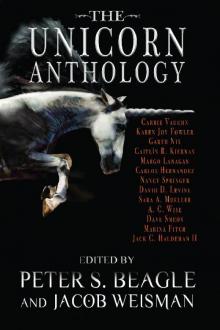 The Unicorn Anthology.indb
The Unicorn Anthology.indb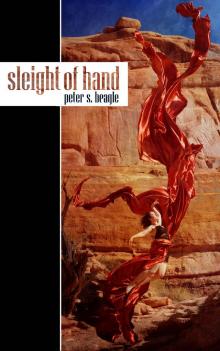 Sleight of Hand
Sleight of Hand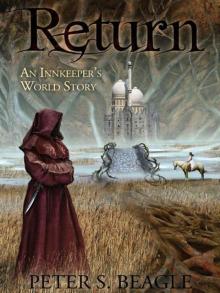 Return
Return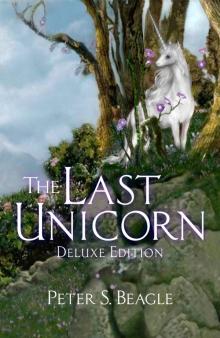 The Last Unicorn
The Last Unicorn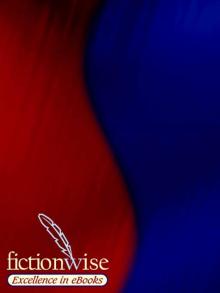 Two Hearts
Two Hearts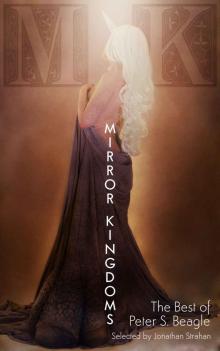 Mirror Kingdoms: The Best of Peter S. Beagle
Mirror Kingdoms: The Best of Peter S. Beagle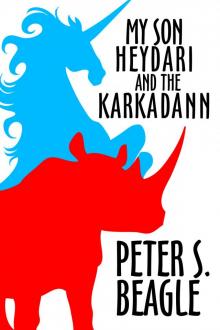 My Son Heydari and the Karkadann
My Son Heydari and the Karkadann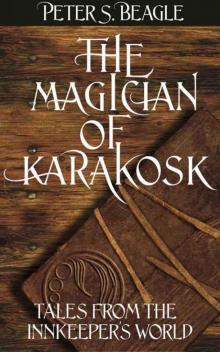 The Magician of Karakosk, and Other Stories
The Magician of Karakosk, and Other Stories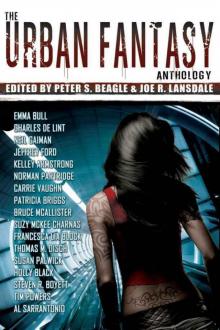 The Urban Fantasy Anthology
The Urban Fantasy Anthology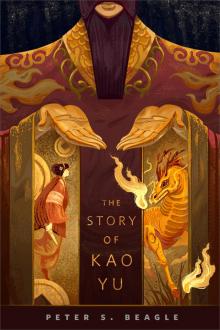 The Story of Kao Yu
The Story of Kao Yu The Karkadann Triangle
The Karkadann Triangle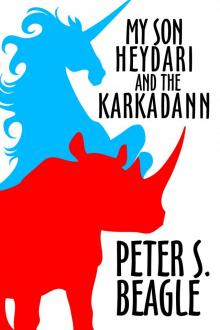 My Son and the Karkadann
My Son and the Karkadann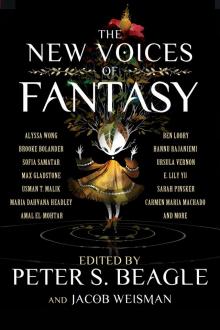 The New Voices of Fantasy
The New Voices of Fantasy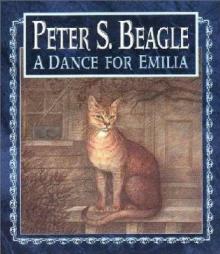 A Dance for Emilia
A Dance for Emilia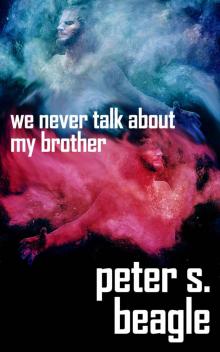 We Never Talk About My Brother
We Never Talk About My Brother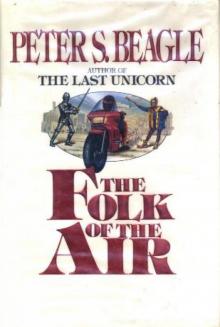 The Folk Of The Air
The Folk Of The Air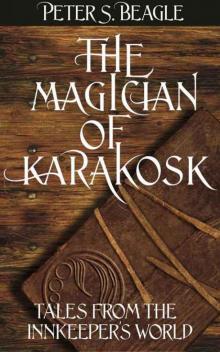 The Magician of Karakosk: Tales from the Innkeeper's World
The Magician of Karakosk: Tales from the Innkeeper's World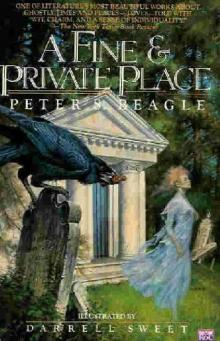 A Fine and Private Place
A Fine and Private Place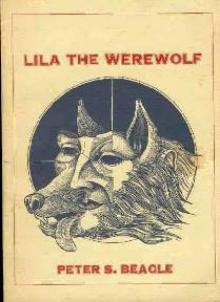 Lila The Werewolf
Lila The Werewolf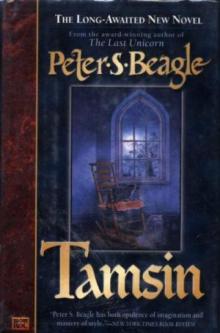 Tamsin
Tamsin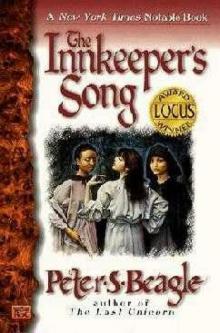 Innkeeper's Song
Innkeeper's Song